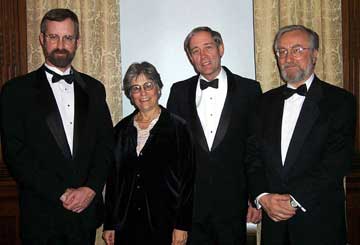
|
|
(from left) James H. Merrell, Linda Gordon, President George Rupp and John W. Dower.
|
Three acclaimed books and their authors have received the Bancroft Prize for the year 2000, one of the most prestigious awards in the field of history. The award is presented annually to the authors of books of exceptional merit and distinction in the fields of American history, biography or diplomacy by the Trustees of Columbia University.
Each book--one, a tale of Irish orphans destined for Mexican families in the Southwest and their subsequent abduction; another, a study of the turbulent path of Japanese society while under American occupation following World War II, and the third, a chronicle of the struggles of European frontiersmen acting as Indian-white go-betweens in 18th Century Pennsylvania--contributes to today's understanding of our past.
The recipients were honored at a formal dinner hosted by the Department of History and the University Libraries on Wednesday, April 5. The three recipients are: John W. Dower, the Elting E. Morison Professor of History at the Massachusetts Institute of Technology, for "Embracing Defeat: Japan in the Wake of World War II," published by W. W. Norton and Company, Inc. and the New Press; Linda Gordon, professor of history at the University of Wisconsin, for "The Great Arizona Orphan Abduction," published by Harvard University Press; and James H. Merrell, the Lucy Maynard Salmon professor of history at Vassar College and second-time Bancroft winner for "Into the American Woods: Negotiators on the Pennsylvania Frontier," published by W.W. Norton and Company, Inc.
President George Rupp presented the awards. Eric Foner, the Dewitt Clinton Professor of History at Columbia and president of the American Historical Association, and Elaine Sloan, vice president for Information Services and University librarian presided.
Linda Gordon has twice been nominated for the National Book Award in History and is considered by critics to be one of today's finest social historians. Her book The Great Arizona Orphan Abduction is a tale of a forgotten episode in American history. In 1904, 57 Irish toddlers from the New York Foundling Hospital are sent by train in the care of the Sisters of Mercy to Catholic, Mexican homes in a wild-west boom town in Arizona. The town's Anglos, furious at the "interracial" transgression, formed a vigilante squad that kidnapped the children and nearly lynched the nuns and the local priest. In conclusion, the U.S. Supreme Court ruled in favor of the vigilantes. Author William Cronon notes this timeless tale gives a "remarkably revealing window on past American attitudes towards religious prejudice, ethnic and racial identity, competing notions of the family, class conflict and ideologies of childhood."
Noted as the most important book there is about Japanese-American relations by scholars, Embracing Defeat: Japan in the Wake of World War II, winner of the National Book Award for nonfiction, gives a vivid portrayal of the many ways that the Japanese were challenged to "start over"--from leaders to the masses during the American occupation from 1945 to 1952. Long engaged with issues of war, peace, power and justice in modern Japanese history and US.-Japan Relations, author John W. Dower is considered to be America's foremost historian of the Second World War in the Pacific.
Into the American Woods: Negotiators on the Pennsylvania Frontier written by two-time Bancroft Prize winner, James H. Merrell, provides new perspective on Native American-European Diplomacy in the late 17th and early 18th Centuries. The book is considered to be a "pathbreaking scholarly work by one of the nation's leading historians of the interaction between Native Americans and European newcomers in early America" according to the Kirkus Reviews. It is a beautifully written reconstruction of how Indian and European go-betweens survived in the woods, dealing with problems of food, travel, lodging, and safety, and how they sought to bridge the vast cultural gaps between the Europeans and the Indians before bloodshed and hatred of frontier conflict made such activities obsolete.
The Bancroft Prizes were established at Columbia in 1948 with a bequest from Frederic Bancroft, the historian, author and librarian of the Department of State, to provide steady development of library resources, to support instruction and research in American history and diplomacy and to recognize exceptional books in the field. Books eligible for the 2000 prizes, which are awarded annually by the University Trustees, were published in 1999. The prize includes an award of $4,000 to each honoree.
|
